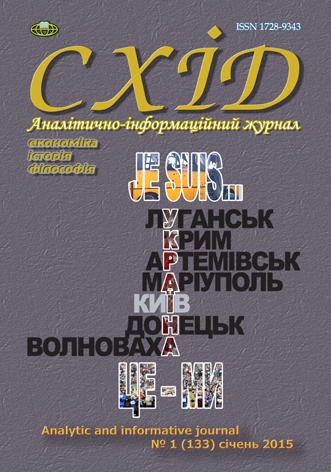Peculiarities of ethnic and social identification of Turkic Diaspora
DOI:
https://doi.org/10.21847/1728-9343.2015.1(133).40158Keywords:
identity, identification, integration, segregation, Turkic Diaspora, "Homo ethnic"Abstract
The article is devoted to the problems of identification of Turkic Diaspora. Analyzed in detail migration peculiarities of Turkic Diaspora in Ukrainian and German society. Determined that due to historical, geographic, geopolitical, linguistic factors influencing the integration processes in the host cell Diaspora Turkic-speaking society closer to Ukrainian, which simplifies the preservation of their cultural identity while uniting into a single community of integration. Social policy in Germany has created a high-quality environment for Turkic Diaspora, but having our own media, educational and cultural centers, financial support, only weakens, promotes separation of existence in their ghettos, segregation creates community.
Segregation is sanctioned policy of separate development. At the state level, a policy whose aim is to isolate cultural groups. Integration is a variant of the groups in which group members retain their cultural identity while combined into a single community.
In various scientific concepts the linguistic factor is one of the basic elements of both the external and internal identity. Next was determined: a common origin, a common territory, common historical background, religion, material and spiritual culture and traditions. Renowned researcher S. Huntington noted that cultural identities (ethnic, national, religious) are central and unions, government policies consist of considering cultural proximity and cultural differences.
Turks in Germany are one of the least integrated communities in the country and largely retain their native language, religion, commitment to family traditions, music and culture. And in the opinion of the representatives of Turkic Diaspora in Germany, we have existence of danger of being Turkic zed of Europe.Downloads
References
Baklanov I. (2010), "Homo ethnic": the problem of ethnic identity, in: Questions of social theory: Scientific almanac, Volume IV, Moscow, 528 p. (rus).
Brubaker R. "Diaspora of cataclysm" in central and eastern Europe and their relationship with their homeland (for example, Weimar Germany and Soviet Russia), available at: http://www.diaspory.ru/index.php?option=com_content&view=article &id=5&Itemid=5 (rus).
Volkov P. (2006), Role of Gagauz minority in the Odessa region in the development of bilateral relations at the regional level, in: Ukrainian-Turkish relations: state and development prospects: International Conference, Odessa, 152 p. (rus).
Homanyuk M. (2006), Problems of social adaptation Meskhetian Turks in Ukraine, in: Ukrainian-Turkish relations: state and development prospects: International Conference, Odessa, 152 p. (ukr).
Homanyuk M. (2007), Social adaptation and integration of Meskhetian Turks in Ukrainian society, Kharkiv, 184 p. (ukr).
Yevtukh V. (2002), Ethnosociology: formation of conceptual issues and terminology in: Problems of development of sociological theory. Theoretical problems change the social structure of Ukrainian society: Research reports and messages II All-Ukrainian sociological conference, Kyiv, 533 p. (ukr).
Zakovorotnaya M. The identity of the man: the social and philosophical aspects, available at: http://filosof.historic.ru/books/item/f00/s00/z0000729/st000.shtml (rus).
Kovalchuk I. Top Rated mosque in Ukraine - from the oldest to the most beautiful, available at: segodnya.ua/life/lsociety/Samye-samye-mecheti-Ukrainy-ot-drevneyshey-do -krasiveyshey-446906.html (rus).
Konstantinov V., Kovaleva N. (2010), Social and psychological analysis of the phenomenon of separation of migrants to their homeland: Monograph, Penza, 100 p. (rus).
Merkel said about the failure of multiculturalism, available at: http://www.bbc.co.uk/russian/international/2010/10/101016 _merkel_multiculturalism_failed.shtml (rus).
Osdzhan K. (2006), Activities Turkish Cooperation and Development Agency (TIKA) in Ukraine, in: Ukrainian-Turkish relations: state and development prospects: International Conference, Odessa, 152 p. (ukr).
Patyrbayeva K. (2012), Identity: social-psychological and social-philosophical aspects, Perm, 250 p. (rus).
Pivoyev V. (2006), Ethnicity and Nation: problem of identification, Petrozavodsk, 109 p. (rus).
Slobodenyuk V. (2011), Turkish Diaspora in Germany: the socio-economic, political and cultural situation in the second half of the XX - early XXI century, available at: http://www.dissercat.com/content/turetskaya-diaspora-v-germanii-sotsialno-ekonomicheskoe-politicheskoe-i-kulturnoe-polozhenie#ixzz3RYUXs7Ef (rus).
Schaeffer G. Diaspora in world politics, available at: http://www.diaspory.ru/index.php?option=com_content&view= article & id = 5 & Itemid = 5 (rus).
Shnirelman V. (2003), War of Memory: Myths, Identity and Politics in Transcaucasia, Moscow, 592 p. (rus).
Diakonoff Igor, Hosking Geoffrey (1999), The Paths of History, Publisher: Cambridge University Press, 368 p. (eng).
Deniz Göktürk (2010), Turkish delight - German fright. Unsettling oppositions in transnational cinema, available at: http://eipcp.net/transversal/0101/goektuerk/en (eng).
Panel Discussion: Diaspora Entrepreneurship in Turkey and in Germany Organizers: Prof. Dr. Jörg Freiling (University of Bremen), Prof. Dr. Michael Gessler (University of Bremen), available at: http://www.lemex.uni-bremen.de/files/freiling/Sonstiges/Programm_Tuerkeiwoche.pdf (eng).
International Journal on Multicultural Societies (IJMS) (Revised edition) Vol. 11, No. 2, 2009 “Turks Abroad: Settlers, Citizens, Transnationals”, available at: http://unesdoc.unesco.org/images/0018/001886/188648e.pdf (eng).
Downloads
Published
How to Cite
Issue
Section
License
Copyright (c) 2015 Nina Bilokopytova

This work is licensed under a Creative Commons Attribution-NonCommercial-NoDerivatives 4.0 International License.
1. Authors bear responsibility for the accuracy of facts, quotations, numbers and names used.
2. Manuscripts are not sent back.
3. The publisher does not always agree with the authors' opinion.
4. The authors reserve the right to authorship of the work and pass the first publication right of this work to the journal under the terms of a Creative Commons Attribution-NonCommercial-NoDerivatives 4.0 International License. This license allows others to distribute (copy) the published work for non-commercial purposes, provided there is mandatory attribution to its authors and a link to the first publication in our journal.
5. The authors have the right to conclude separate supplement agreements that relate to non-exclusive work distribution in the form in which it has been published by the journal (for example, to upload the work to the online storage of the journal or publish it as part of a monograph), provided that the reference to the first publication of the work in this journal is included.

